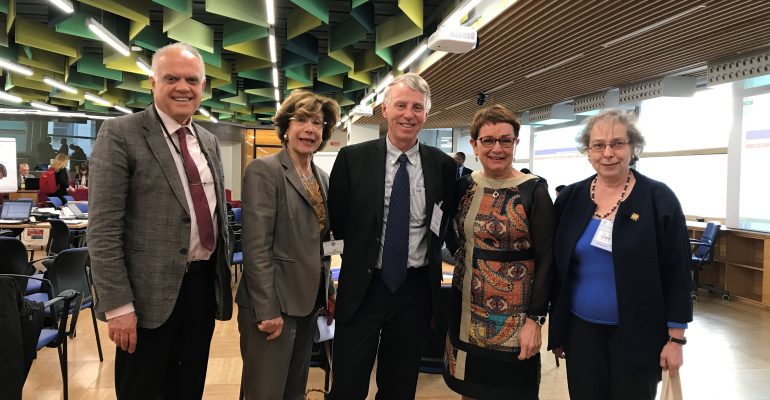During the Global Framework for Action to Cope with Water Scarcity in Agriculture Partners’ and stakeholders’ Meeting, held at FAO Headquarters in Rome on 19 and 20 April 2017, Soroptimist International President-Elect and Women for Water Partnership President, Mariet Verhoef-Cohen was appointed Vice-Chair of the interim Steering Committee (SC), which acts as a forum entrusted to coordinate activities under the Global Framework, and to give effect to the plans and proposals of the partner. This SC will be chaired by renowned professor Torkil Jønch Clausen.
Mariet Verhoef-Cohen says: “I am very honoured to be chosen Vice-Chair of this prominent group on Water Scarcity in Agriculture. It will be with great pleasure to work together with Torkil Clausen. The SC consists of five groups: Governments, UN organisations, Universities, Research Institutes and NGOs/CSOs. I will focus on Gender and seek to liaise SDGs 5 and 6 to make sure that the 40% female farmers are well represented in this Global Framework, as the unique expertise and knowledge held by women and indigenous people will be vital in efforts to address water scarcity.”
The Global Framework launched by FAO and partners at the climate meeting in Marrakech in November 2016 (COP22) is designed to bring together key players across the globe and across sectors to tackle the collective challenge of using water better in agriculture to ensure food security for all. It is an initiative for partners from all fields and backgrounds to collaborate in supporting countries and stakeholders in their commitments and plans related to the 2030 Sustainable Development Agenda, the Paris Climate Agreement (including implementing nationally determined contributions) and other plans and programmes related to agriculture and water.
At this first Global Framework meeting, partners agreed on a Rome Statement on Water Scarcity in Agriculture (link: http://www.fao.org/land-water/overview/global-framework/rome-statement/en/). The statement stresses the importance of “realizing that no single stakeholder can solve the complex, multifaceted issues facing the agriculture sectors today and that new and innovative partnerships are needed to tackle them effectively, including governments, civil society (including women and their representative organizations), the private sector, donors, academia, research institutions, non-governmental organizations and intergovernmental and multilateral organizations.”
It also highlights that in addition to Sustainable Development Goal 6 (Access to safe Water and Sanitation for all), effective water management is related to the targets contained within the majority of all 17 SDGs of Agenda 2030 of the United Nations. And agrees “that an integrated approach to coping with water scarcity in agriculture is essential and that this includes the consideration of the entire food system (from field to fork), including how this system interacts with key issues such as poverty, climate change adaptation, resilient livelihoods, gender equality, human health, land tenure and use, sustainable soil management, energy, urbanization, transboundary waters, food waste, trade, ecosystem services and biodiversity.”
Lead image Left to Right: Olcay Ünver, Deputy Director, Land and Water Division FAO; Cristina Visconti Gorajski, BPWI Representative FAO; Torkil Clausen, Chair SC; Mariet Verhoef-Cohen, Vice Chair SC; Liliana Mosca, SI Representative, FAO
This news story was first published by WfWP at http://www.womenforwater.org/fao-water-scarcity-meeting-rome-19-20-april.html

